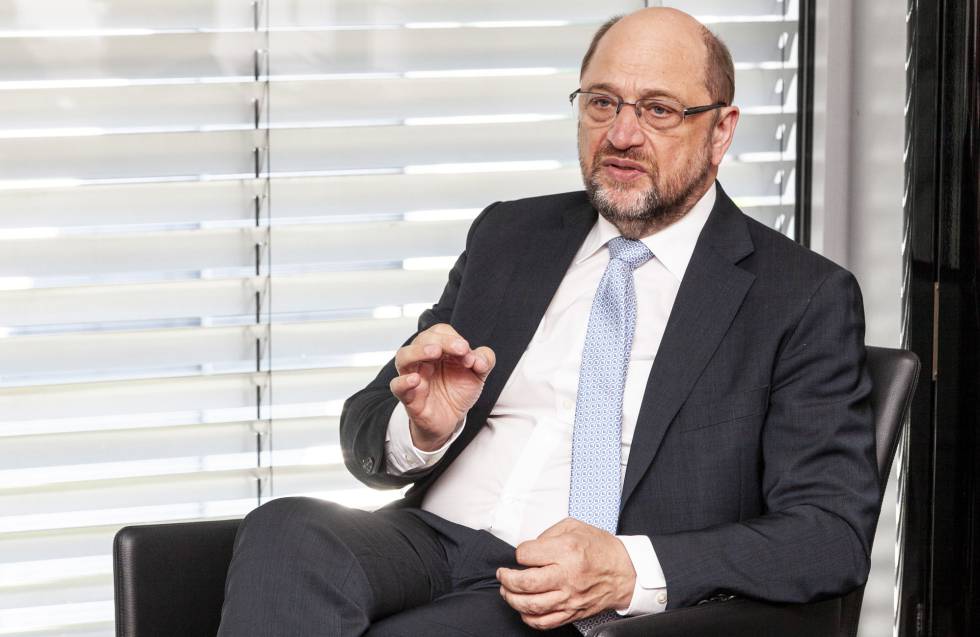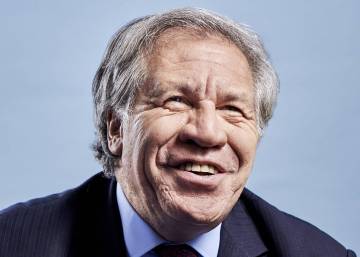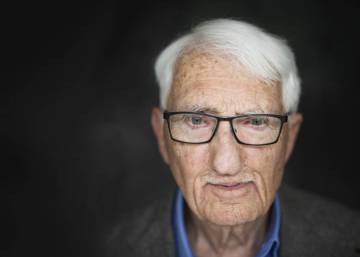“The time has come for the pro-European left to mobilize”
Ex-leader of Germany’s SPD speaks about the urgent need to fight rampant nationalism and populism
Berlin

German politician Martin Schulz. PATRICIA SEVILLA CIORDIA
Martin Schultz’s story is right out of a Greek tragedy. President of the European Parliament from 2012 to 2017, he did not seek re-election and instead strove to save social democracy in his own country by running as the Social Democratic Party of Germany (SPD) candidate to the chancellorship in the 2017 elections.
For a year, he rode a rollercoaster in which the media and the opinion polls alternately adored him and despised him. He swore he would never serve in an Angela Merkel government, yet ended up seeking the foreign affairs portfolio in the current executive. Grassroots party members demanded his head on a platter in order to salvage the SPD’s credibility.
What we are experiencing is a brutalization of language in politics
Four months after his fall from grace, the man who once wanted to be a soccer player and ended up being a bookseller sits inside his office at the Bundestag, where he defends the need for a progressive counter-revolution in Europe that will combat the rampant nationalism and populism in the continent. “The time has come for the pro-European left to mobilize,” he says in a joint interview with EL PAÍS, La Repubblica and Le Figaro.
Question. You think that Europe is going through a critical time. Why is that?
Answer. The idea of Europe is based on three pillars: solidarity, respect and dignity. But we are going through times in which those pillars are at risk. One example is the populist incitement against minorities and the search for short-term benefits, as can be seen in Italy. It is almost fascist for the interior minister to want to register the Roma people. What we are experiencing is a brutalization of language in politics that is fracturing the principles of solidarity, respect and dignity. This means the end of democracy. For a time it was a fringe movement, but now it has penetrated parliamentary democracy and the centers of government. And that is dangerous.
Democrats, progressives, liberal and humanistic forces need to admit that the right has been organizing itself for a long time now, for instance as an anti-European political group in the European Parliament. In this case, “the right” means anti-democratic, anti-European and populist forces. It is disgraceful the way they attack minorities. It is disgraceful for them to use the greatest peace project in the world, European transnational democracy, as a scapegoat. These are the same people who want to pit us against one another and who use anti-European rhetoric to re-nationalize politics.
This will take us to the abyss. They are acting irresponsibly, and it’s not just the far right but also the far left, as we’ve witnessed with Mélenchon in France. Matteo Salvini in Italy, Heinz-Christian Strache and Sebastian Kurz in Austria, Viktor Orban in Hungary and other right-wing populists are determined to liquidate the EU. And determined people cannot be faced with hesitating people. We need a counter-movement. We need a rebellion of decency. Those of us who believe that cooperation between states and nations is the best thing that humanity could do in the 21st century must rise and get organized. The time has come for a real, left-wing, pro-European movement.
Q. Why are the populists making inroads in the battle for ideas?
A. We are living through times of multipolar change: the world has become a more insecure, less transparent place. Internet companies have more power than the states. It’s understandable that people want more security and simple things. Those who paint the world in black and white, like Trump or Salvini, propagate their simple ideas and that’s very attractive. You need to have the courage to say that the world is complicated and that we’re going to find solutions, and then you have to describe and implement those solutions. But the right is focusing on the right problems, which the left also finds shocking: that multinationals are avoiding paying their taxes while citizens do. That inequality is becoming increasingly worse. But don’t be fooled: right-wing populists are not going to do left-wing politics.
Those who paint the world in black and white, like Trump or Salvini, propagate their simple ideas and that’s very attractive.
Q. Social democracy is in crisis everywhere in Europe. How can it win voters back?
A. It is true that there’s a crisis. We have lost elections and party members, but not everywhere. There are lots of opportunities for the social democrats. The question is: why do people with urgent needs for state protection turn away from social democracy? Perhaps because they have the feeling that the state’s role as an unconditional protector has been lost. It is a message that is not only reaching the lowest earners, but also the middle class. In the last 10 years, top-down redistribution has been the order of the day. And the banking sector’s bankruptcy has been avoided thanks to taxpayers’ money.
Q. Germany has emerged from the immigration issue in a much weaker state.
A. The domestic chaos caused by the Christian Social Union (CSU) is dramatic for Europe. At a time when we are experiencing American unilateralism and Russian authoritarian expansion, Europe cannot engage in regressive politics; it should display a fortitude based on the values of a democratic society with an integrated economy in which welfare reaches everyone instead of just a few.
Q. How do you view the agreement between Angela Merkel and Emmanuel Macron for a eurozone budget?
A. It is still insufficient. We need an ambitious investment budget that will eliminate the tremendous disparities in the euro zone. The weight of inequalityhas also resulted in an enormous surplus in Germany. That is why I think that Germany’s contribution to this budget is a matter of justice. The budget needs to have enough investment capacity so that in places like Spain, Italy or Greece, young people will have job prospects.
Q. What role do you want to play in Germany now?
A. I want to be a deputy who will defend the European chapter of the coalition agreement. This coalition must wage the battle for the European Union.
English version by Susana Urra.








































No hay comentarios:
Publicar un comentario